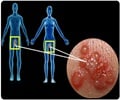Just four out of ten patients with genital herpes actually knew that they had the disorder.

Matilda Berntsson, a specialist in skin and sexually transmitted infections at the Frolunda Specialist Hospital's skin clinic and researcher at the Sahlgrenska Academy conducted the study.
In her thesis she investigated the prevalence of genital herpes type 2 among patients attending sexual health clinics in Gothenburg.
Her investigation included more than 1,000 patients, both male and female.
Genital herpes caused by herpes simplex virus type 2 infects the genital membranes before moving to the nerve ganglia alongside the spinal cord, where it remains for the rest of a patient's life.
Although many people who have been infected do not experience any discomfort, the virus can be activated and spread further through sexual contact. The disorder can also result in recurring genital problems.
Advertisement
"The presence of antibodies in the blood shows that a person is infected with the virus," she stated.
Advertisement
However, a third of those patients who did not know that they were infected reported typical symptoms in the form of recurring genital blisters and sores at a follow-up visit.
"The study reinforces our perception that genital herpes is common and that most people carrying it are unaware that they have it," Berntsson said.
"Non-specific recurring genital symptoms could be undiagnosed herpes, which can be detected with a simple test at the doctor's," she explained.
She therefore suggests that people with non-specific genital symptoms who are worried about genital herpes should see a doctor for an examination.
"If the symptoms and/or findings suggest herpes, there are good methods for testing for the disorder," she said.
"Pronounced symptoms can be treated with medicines that alleviate discomfort, and a daily preventative treatment can be given for longer periods where recurrences are frequent," Berntsson added.
Source-ANI










